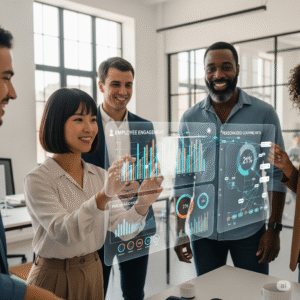The Human Resources landscape is in the midst of a profound transformation, driven by the accelerating adoption of Artificial Intelligence. Far from being a niche technology, AI in HR is rapidly becoming an indispensable tool for organizations looking to optimize their talent strategies, enhance operational efficiency, and cultivate a truly exceptional employee experience. From the initial stages of attracting and hiring talent to nurturing professional growth and fostering a positive workplace culture, HR tech AI is reshaping every facet of human capital management.
This comprehensive guide will explore the revolutionary impact of AI in HR, delving into its applications in recruitment, training, and the broader employee journey. We’ll examine how intelligent systems are streamlining processes, providing unprecedented insights, and ultimately empowering HR professionals to become more strategic partners within their organizations.
AI in Recruitment: Sourcing Smarter, Hiring Faster
Recruitment is often the first significant touchpoint between a candidate and an organization, and it’s an area where AI in HR is making tremendous strides. The sheer volume of applications, the need to identify the best fit, and the imperative to reduce bias make it a prime candidate for AI intervention.
Intelligent Candidate Sourcing and Screening
Gone are the days of manually sifting through thousands of resumes. AI in HR tools, particularly those falling under HR tech AI, can now intelligently scan vast databases of resumes and online profiles, matching candidate skills and experience to job requirements with remarkable precision. These tools go beyond keyword matching; they use natural language processing (NLP) to understand context, identify transferable skills, and even predict potential cultural fit. This significantly reduces the time recruiters spend on initial screening, allowing them to focus on more strategic tasks like building relationships with promising candidates.
For instance, an AI-powered recruitment platform can analyze a job description for a software engineer role, then scour LinkedIn, GitHub, and other professional networks to identify individuals with the precise programming languages, project experience, and even contributions to open-source projects that align with the company’s needs. This level of granular analysis is incredibly difficult and time-consuming for humans alone.
Automated Interview Scheduling and Chatbots
The administrative burden of interview scheduling can be immense, especially for high-volume roles. AI-powered scheduling tools can automate this process entirely, finding optimal times that suit both candidates and hiring managers, sending invitations, and even handling rescheduling. Beyond scheduling, AI chatbots are increasingly being deployed to engage with candidates. These conversational HR tech AI agents can answer frequently asked questions about the company, job roles, benefits, and even provide real-time updates on application status, offering a consistent and immediate candidate experience 24/7. This frees up HR teams to focus on more complex candidate interactions.
AI in Training and Development: Personalized Learning at Scale
Once onboarded, nurturing employee growth and ensuring they have the necessary skills is crucial for organizational success. AI in HR is transforming learning and development (L&D) by enabling hyper-personalized training programs and continuous skill development.
Personalized Learning Paths
Every employee has unique learning styles, skill gaps, and career aspirations. AI can analyze an employee’s performance data, job role, and stated career goals to recommend highly personalized learning paths. This moves away from a one-size-fits-all approach to training, ensuring that employees are learning exactly what they need, when they need it. For example, an AI system might identify that a marketing specialist needs to improve their data analytics skills based on recent project performance and then suggest specific online courses, workshops, or even internal mentorship opportunities. This not only boosts the effectiveness of training but also significantly increases employee engagement.
Adaptive Learning and Skill Gap Analysis
HR tech AI platforms can adapt learning content in real-time based on an individual’s progress and comprehension. If an employee struggles with a particular concept, the AI can provide additional resources or re-explain it in a different format. Conversely, if they demonstrate mastery, the system can accelerate them to more advanced topics. Furthermore, AI can continuously analyze the skills landscape within an organization and compare it against industry trends, proactively identifying potential skill gaps before they become critical. This allows HR to develop targeted reskilling and upskilling initiatives, ensuring the workforce remains future-ready.
Case Studies: AI Driving HR Innovation
The impact of AI in HR is best illustrated through real-world applications by leading companies.
Case Study 1: Unilever’s AI-Powered Recruitment Revolution
Unilever, a global consumer goods giant, faced the monumental task of sifting through millions of job applications annually. To streamline this process and ensure a fairer, more efficient hiring experience, they implemented an AI in HR solution. Candidates initially participate in AI-powered “games” (neuroscience-based assessments) that evaluate inherent traits and aptitudes relevant to job success, without traditional resume biases. Subsequently, shortlisted candidates engage in video interviews analyzed by AI for behavioral cues and verbal responses.
This system, which falls squarely under HR tech AI, allowed Unilever to reduce the time spent on recruitment significantly, cutting over 70,000 hours of human interviewing and assessment time annually. More importantly, it led to a more diverse pool of candidates being selected for interviews, demonstrating how AI can help mitigate unconscious bias in the early stages of recruitment and lead to better business outcomes through diverse talent. This direct impact on efficiency and diversity translates into better talent acquisition, which directly contributes to the company’s competitive edge and profitability.
Case Study 2: IBM’s AI for Employee Experience and Retention
IBM has been a pioneer in leveraging AI in HR for internal purposes, particularly in enhancing employee experience and predicting attrition. Their AI models analyze various internal data points, including employee sentiment from surveys, promotion history, and compensation data, to predict with high accuracy which employees might be at risk of leaving the company. This predictive analytics capability, a hallmark of advanced HR tech AI, allows HR business partners and managers to proactively intervene, offering personalized career development opportunities, addressing concerns, or adjusting compensation.
IBM reportedly saved hundreds of millions of dollars in potential attrition-related losses by effectively using AI to retain valuable talent. Beyond retention, IBM utilizes AI chatbots (like “My HR”) to provide instant, 24/7 support for employee queries regarding benefits, policies, and internal processes. This significantly reduces the HR team’s administrative burden, allowing them to focus on more strategic initiatives like cultural development and leadership training, ultimately contributing to a more engaged and productive workforce.
Enhancing the Employee Experience with AI
The true potential of AI in HR extends beyond recruitment and training to fundamentally reshape the entire employee experience, making it more personalized, supportive, and efficient.
Intelligent Onboarding and Support
A smooth onboarding process is critical for new hire retention and productivity. HR tech AI can personalize onboarding journeys, providing new employees with tailored information, resources, and even connecting them with mentors based on their role and preferences. Chatbots can answer initial queries about benefits, company policies, and IT setup, making the first few weeks less overwhelming. This creates a positive first impression and accelerates the new hire’s integration into the company culture, leading to faster time-to-productivity.
Performance Management and Feedback
AI is revolutionizing performance management by moving beyond annual reviews to continuous, real-time feedback loops. AI in HR tools can analyze performance data from various sources (e.g., project management systems, communication platforms) to provide managers with objective insights into employee strengths and areas for development. Sentiment analysis of internal communications can also flag potential issues or disengagement early, allowing for timely intervention. This data-driven approach fosters a culture of continuous improvement and transparent feedback, helping employees understand their impact and growth opportunities.
Employee Wellness and Engagement
Predictive analytics and sentiment analysis within HR tech AI platforms can help HR departments understand the overall sentiment of their workforce and identify factors contributing to disengagement or burnout. By analyzing anonymized data from internal surveys, communication patterns, and even scheduling tools, AI can highlight trends that might indicate stress or dissatisfaction. This enables HR to implement proactive wellness programs, adjust workloads, and foster a more supportive work environment. AI can also personalize recognition programs, ensuring that employees receive appreciation in ways that resonate most with them, thereby boosting morale and engagement.
Key AI Tools for Modern HR
To leverage the power of AI in HR, organizations can explore a range of specialized tools and platforms:
- Eightfold AI: A talent intelligence platform that uses AI to help companies hire, retain, and grow a diverse workforce by matching internal and external candidates to opportunities.
- Paradox: Offers conversational AI for recruitment, automating tasks like screening, scheduling, and answering candidate questions through an AI assistant named Olivia.
- Textio: An augmented writing platform that uses AI to analyze job descriptions and other talent-related content for biased language, helping create more inclusive and effective communications.
- Degreed: An AI-powered learning platform that helps individuals and organizations understand and develop the skills needed for the future of work, offering personalized learning paths.
- Gloat: An AI-powered internal talent marketplace that connects employees with personalized career opportunities, projects, and mentorships, fostering internal mobility and skill development.
- Moveworks: An AI-powered employee experience platform that resolves employee questions and IT issues instantly, reducing helpdesk tickets and improving employee satisfaction.
- Culture Amp: An employee experience platform that uses AI to analyze survey data and feedback, providing insights into employee engagement, performance, and development.
Implementing AI in HR: A Human-Centric Approach
While the benefits of AI in HR are compelling, successful implementation requires a thoughtful, human-centric approach.
- Define Clear Objectives: Before adopting any HR tech AI solution, clearly articulate what problems you aim to solve or what efficiencies you want to gain. Is it reducing time-to-hire? Improving employee retention? Personalizing training?
- Start Small and Iterate: Begin with pilot projects in specific HR functions (e.g., automated resume screening for one department) to test the AI’s effectiveness and gather feedback. Learn from these experiences and iterate before scaling.
- Ensure Data Quality and Ethics: AI models are only as good as the data they’re trained on. Ensure your data is clean, accurate, and diverse to prevent perpetuating biases. Establish clear ethical guidelines for AI usage, particularly in hiring and performance evaluations. Transparency with employees about how AI is being used is crucial for trust. A recent McKinsey report emphasizes the importance of ethical AI guidelines in HR to mitigate bias and ensure fairness.
- Upskill HR Professionals: AI isn’t replacing HR; it’s empowering them. Invest in training your HR team to understand AI capabilities, interpret data insights, and effectively leverage these tools. Their strategic role will become even more critical.
- Maintain the Human Touch: AI automates tasks, but it cannot replicate empathy, emotional intelligence, or complex human interactions. HR’s role will shift to focus more on strategic initiatives, complex problem-solving, and fostering genuine human connections. Tools like Zapier can help integrate various AI and HR systems, automating workflows while maintaining human oversight.
- Measure ROI: Continuously track key metrics (e.g., time saved, recruitment costs, employee engagement scores, retention rates) to demonstrate the return on investment of your AI in HR initiatives.
The Symbiotic Future of HR and AI
The future of HR is undeniably intertwined with Artificial Intelligence. AI in HR is not merely a technological enhancement; it’s a strategic imperative that empowers HR departments to move beyond administrative tasks and become true drivers of organizational success. By embracing HR tech AI thoughtfully and ethically, businesses can create more efficient, equitable, and engaging workplaces, ultimately turning data into actionable insights that benefit both the company and its most valuable asset: its people. The journey has just begun, and the symbiotic relationship between human resources and artificial intelligence promises to unlock unprecedented potential in the world of work.
The Future of AI Video Production: Streamlining Editing and Special Effects
The Future of AI Music Composition: Unlocking Limitless Creativity in Sound



